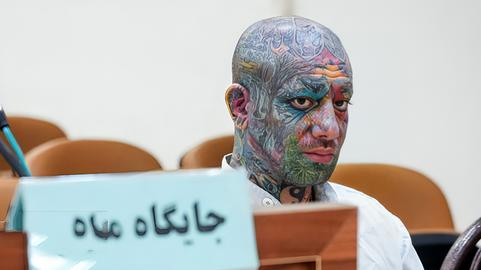You’re listening to Iran’s Weekly Wire; I’m Roland Elliott Brown.
*
Last week, IranWire published a photograph that’s really painful to look at.
It shows two people in a vet’s office crying because their dog has just been shot.
Their names are Parvaneh and Ashkan. They are mother and son.
Ashkan had just taken their dog, Bobby, to Kouhsar Park in Tehran for a walk.
He says a policeman approached Bobby, who was a seven year old female, pulled out his gun, and shot her in the neck.
Ashkan’s not ready to talk about this, but Iranwire spoke to his sister, Maliheh, about the incident.
[Maliheh] “Ashkan took Bobby to the top of Kouhsar. They had gone out at 6pm and returned to the car at half past seven so Bobby could drink some water. Bobby drank some water and barked once, which made Ashkan notice the policeman. Ashkan was holding the leash, but it was long, so Bobby moved forward a little bit. Still, Bobby was a meter and a half away from the policeman. Ashkan called Bobby and she moved toward Ashkan. He noticed that the policeman was going for his gun. He shouted, ‘Don’t shoot. She won’t attack.’”
The policeman, Mehdi Shahbazi, says he shot Bobby because he was scared of her. But Bobby’s owners say he’s lying.
Now, maybe an incident like this could happen anywhere. But IranWire covered this story because in Iran, dogs aren’t just dogs. They are political animals.
Hardline conservatives in Iran depict people who own dogs as unwholesome enemies of God and state.
Last November, an Iranian MP, Ahmed Salek, told IranWire that dogs are unclean and people who keep them don’t hold religious values.
Salek is one of 32 members of the Iranian parliament, or majles, who have introduced an anti-dog bill. It would ban people from keeping dogs as pets. It would punish anyone who keeps a dog with torture by flogging.
And that’s the context for the shooting of Bobby.
Ashkan says that after Officer Shahbazi shot his dog, he told him to “Take this unclean creature away.”
*
But even in this atmosphere of a showdown between dog people and their adversaries, Iran doesn’t seem to have any clear rules on the subject. And owning dogs is popular. Here’s Payam Mohebi. He’s president of the Iranian Veterinary Association:
[Payam Mohebi] The government doesn't say anything. Unfortunately or fortunately we have no law about having a dog in the home or not. In Majles several times they tried to have a law for banning keeping a dog, but these kind of laws never should be accepted by the people because having a dog or having any pet in a home with a human is like a need. It's necessary for human beings.
Mohebi says Iranians have been keeping dogs for thousands of years. He says the Saluki, an Iranian hunting dog, is the oldest breed in the world.
But whereas dogs were once a fixture of rural life, and were used for hunting and guarding livestock, today people keep them in small urban homes.
And they do so despite huge obstacles. Official disapproval is so strong that many dog owners have to live a secret life. Here is Behnaz Pourafshari. She owned a Shih Tzu mix called Lilly in Tehran.
[Behnaz Pourafshari] We have some funny stories about walking a dog , because cannot bring her outside normally, maybe at night, late at night. 11, 12 at night, and then we should go to remote areas that nobody, for example, sees us. I have never experienced a really really relaxed walk, because I am just looking around and I just think that, okay there is no police, there is nobody looking at us? Oh, there is somebody coming? I have to, for example, hide it. And this was stressful for me, all this, always it was stressful. I was always just thinking, what if somebody just complains about our dog in our house? What if they come and want to remove her?
There are a lot of stories about authorities confiscating people's dogs. On IranWire, there are actually photos of police arresting dogs. The fate of “arrested” dogs isn’t clear, but dog owners assume it isn’t pretty.
[Behnaz Pourafshari] I always heard that they arrest the dog and fine the owner, arresting the dog, and then keeping them in a place and not giving them food, and these things, what’s the point? I read here and there that when they remove the dogs, they put them in a bag or something, and then maybe throw them somewhere. Most of the time, the owners don't know where, and then they keep the dogs in really bad condition. Some of them will be dead, or the owner should search a lot to find out where the dog is. I don't know if they can take it back or not.
This fight over dogs has become yet another fault line between two Irans that don’t understand each other.
People often think of these two Irans as the secular one, and the Islamic one. But it’s probably a little more complicated than that.
I spoke to Sheikh Ahmed Haneef. He’s a Shia cleric from the Islamic Center of England in London. He’s a Canadian, but he lived in Iran from 1994 to 2013, and he studied Islam in the clerical city of Qom.
When I asked him what Islam said about keeping a dog at home, his answer surprised me.
[Ahmed Haneef] No problem. It's not forbidden. A dog is considered unclean if you touch it with a wet hand, but no, it's quite alright to have a dog as a pet or a hunting dog, guide dogs, things like that, it’s not problem. We can keep a dog in the house, but most Muslims don't because a teaching by the prophet says that if a dog is kept in the house, the angels leave.
That last part’s a little difficult to hear. He says, “the angels leave.”
Haneef also recognizes the cultural and political rift concerning dog ownership in Iran.
[Ahmed Haneef] Living there for 19 years, owning a dog, and the way one treats a dog in public, is actually political. People walk around with the dog in their arms like a baby, and kiss the dog, and stuff like that, and it's kind of, in a certain sense, it sort of flaunts anti-Islamic values, in this case western values, outwardly. And also, the actual possession of the dog itself is used to show off a kind of passive hostility to Islamic rule. The effect would be very much like let's say like in this society, let’s say you are walking around with a t-shirt that says something like “I am not gay and proud” for example, or something to that effect, right? Something that directly flouts the principles of the society in which we live. Usually you find that the society tends to respond to that in a pretty hostile manner.
IranWire has covered a lot of those hostile responses over the past year. The shooting of Bobby was just the latest.
In April an online video showed people in Shiraz, who appeared to be city employees, injecting stray dogs with what some people claimed was acid. Whatever it was, it obviously caused them an extremely painful death.
Back in January, we reported that city employees in Rasht and Bushehr were shooting stray dogs.
Last year, we heard from a source in Tabriz who said authorities there have starved stray dogs to death, strangled them with barbed wire, and even buried them alive.
Not that Haneef thinks any of that’s okay.
[Ahmed Haneef] The correct treatment of animals is something that is pleasing to God, and a person is rewarded for it. Cruelty to animals could land a person in hell. You have a story of a man who saw a hungry dog, and fed it, or it was thirsty, I can’t exactly remember, and gave it water. And on the Day of Judgement, that person was favourably looked upon by God.
With or without the influence of religion, there are a lot of people in Iran who sympathize with dogs. And the mistreatment of dogs is inspiring a new animal rights movement.
In response to the killing of dogs in Shiraz, protesters gathered outside the Shiraz Town Hall to urge authorities to sterilize and vaccinate strays rather than kill them.
One of them held up a placard that read, “Being a dog is not a crime.”
Animal shelters are springing up, too. A woman named Jila Pour-Irani has set up a donor-funded shelter in Tabriz. She has got local authorities to agree to send the city’s strays to her.
Bobby’s owners also look after injured and abandoned dogs, and put them up for adoption. Right now, they are looking after three puppies.
Now, some listeners might ask why IranWire cares so much about this issue when Iran has one of the worst human rights records in the world.
Well, the two subjects are related.
Last December, security forces arrested and interrogated an animal rights activist, Ali Tabarzadi, for organizing an animal rights protest.
Tabarzadi used Facebook to oppose the anti-dog bill. On it, he wrote , “What we are saying is not to be cruel to any creature for any reason. Slaughter of defenseless animals promotes violence that will very soon come back to haunt us.”
Think of any country that treats its citizens well, and you’ll find that it pays attention to how animals are treated too.
Animal rights movements, like human rights movements, depend on the actions of civil society. The skills people use to advance one cause, can be used to advance the other, because empathy is transferable.
And so is the lack of it. Listen to what Maliheh says about the officer who shot her dog.
[Maliheh] We all went to Kouhsar police station. I asked the policeman, ‘Why did you kill our dog? What did it do?’ Threatening me, he brought out his teargas canister and said, ‘So what if I did? I will kill 10 more. I will even kill people!’
This incident shows just how divided Iran is today. People like Maliheh live their lives as if they were free citizens. Men like Officer Shahbazi lie in wait, and usually get the last word.
*
That’s all from Iran’s Weekly Wire. If you want to find out more about dogs in Iran, join us visit IranWire.com, or join our new Facebook campaign, “Being a Dog is Not a Crime.”






















comments